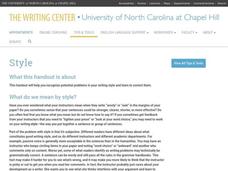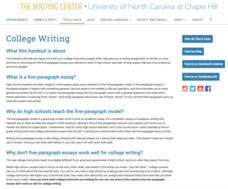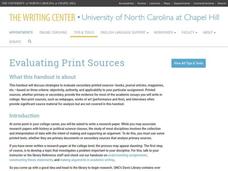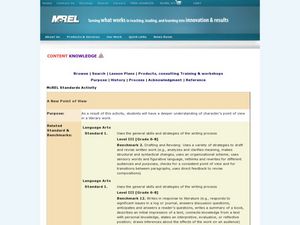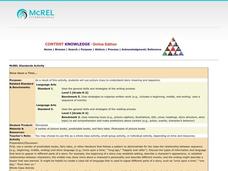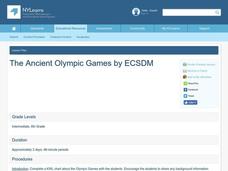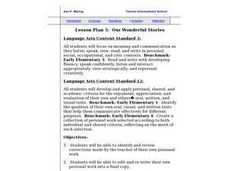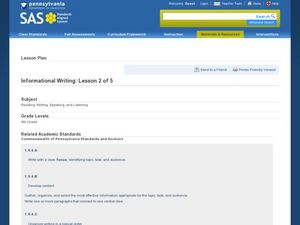University of North Carolina
Style
Just like you choose your clothes to ensure they fit the occasion, you should choose your words deliberately while writing. Style, the main topic of one handout in a series on writing skills, involves choosing words carefully and paying...
University of North Carolina
Argument
What elements make up a successful argument? A helpful resource describes aspects of an argument such as the claim, evidence, counterargument, and audience. Perfect as an individual assignment for a flipped lesson or collaborative work,...
University of North Carolina
College Writing
No matter how difficult high school writing may seem, college writing presents challenges of its own. The fourth in a series of 24 handouts from The Writing Center at UNC breaks down the expectations for college writing. Scholars learn...
University of North Carolina
Evaluating Print Sources
Not all sources are created equal, so how do you evaluate them? Writers learn how to evaluate print sources based on elements such as audience, tone, and argument in the sixth handout of 24 in the Writing the Paper series from the...
College Board
Evaluating Sources: How Credible Are They?
How can learners evaluate research sources for authority, accuracy, and credibility? By completing readings, discussions, and graphic organizers, scholars learn how to properly evaluate sources to find credible information. Additionally,...
Curated OER
A New Point of View
Analyze point of view and how it affects a literary work with this lesson. Middle schoolers create a written piece that focuses on point of view. They review the literary term "point of view," and explore examples of the term in text....
Curated OER
Learning the Roles in Literature Circles
I love literature circles! Get your pupils together and have them discuss the book they are reading. They determine and practice their role in the literature circle then discuss the book they are reading. This is a great introduction to...
Curated OER
Once Upon a Time...
Model for emergent readers how to write a story by interpreting picture clues. For guided practice a second book is used, and then pupils work independently or with an adult to write their own stories based on illustrations.
Curated OER
The Ancient Olympic Games
Sixth graders complete a KWL chart about the Olympic Games. They watch a PowerPoint presentation about ancient Olympics. Each student completes a worksheet during the PowerPoint. Students write a summary of the information presented...
Curated OER
Leaders, Laborers, and Other Perspectives of World War II
How did the women in France feel about their country’s involvement in World War II? Class groups are assigned a country involved in WWII, and individuals within the group adopt the point of view of leaders, laborers, businessmen, women,...
Curated OER
Sequence, Predict, Infer: Pink and Say
Practice sequencing with your 2nd graders via Patricia Polacco's Civil War book Pink and Say. Begin with a blindfold and a bag of mystery items. Connect their use of clues to identify what they can't see with the skill of making...
Curated OER
Writing a Personal Letter Using the Short Story "Eleven"
Challenge your class to connect to the text of "Eleven" by Sandra Cisneros with this activity, which prompts them to write a personal letter from the main character's point of view. The story, prompt, and letter template are all included...
Curated OER
Phineas Gage: Notecard Vocabulary Strategy
Understanding the vocabulary in a text, especially a text like Phineas Gage: A Gruesome but True Story About Brain Science that includes quite a few technical terms, can be the key to understanding the text as a whole. Learners focus on...
Curated OER
Leveled Vocabulary for And Then There Were None
Chaotic, perjury, tenacious, vague, predatory, idiosyncrasy. Using Marzano and Brown’s six steps of direct instruction for vocabulary (choose, restate, illustrate, use, discuss, play) readers of And Then There Were None engage in a...
Curated OER
Communities in Crisis Lesson 1: Primary Source? What is That?
Distinguish between primary and secondary source documents using the theme of philanthropy. Middle schoolers discuss Anne Frank: The Diary of Young Girl as a way to study the past using a primary source. Then they investigate how to...
Curated OER
Our Wonderful Stories: Lesson Plan 5
The fifth installment in a writing unit that culminates with a Hyperstudio illustrated group story project, this plan is ripe with ideas for ways to design group writing projects for elementary writers. Use the whole unit as a base from...
Curated OER
Reading in Context: The Diary of Anne Frank
Step into the hopeful and tragic world of Anne Frank with this lesson on reading in context. After complete a variety of activities related to the first two scenes of The Diary of Anne Frank, eighth graders participate in a read...
Curated OER
Is It Fact or Opinion?
Distinguish between fact and opinions in this nonfiction reading instructional activity. Middle schoolers read 'The Diary of an Early American Boy' and work in groups to analyze the text. They record the facts and opinions for the text.
Curated OER
A Fair Trade
Students examine a piece of art to find objects and symbols used by the artist. In this visual art lesson plan, students look at Jaun Quick-to-See Smith's, "Trade Canoe for Don Quixote." They look for symbols and items that show the...
Pennsylvania Department of Education
Informational Writing: Lesson 2 of 5
Introduce expository writing to your elementary learners. Young authors write a three-paragraph informational paper using the steps of the writing process. They follow guided lessons to experience each of five steps. Included are tons of...
Curated OER
The Iditarod Race Compared with the Movie, Iron Will
Feel the freezing rush of an Alaskan sled dog race in this reading lesson. Using research about the Iditarod Trail Sled Dog Race, seventh graders compare and contrast the depiction in the movie Iron Will. The lesson lasts for seven days...
Curated OER
Lesson Plan: The Net Neutrality Debate
Should Internet users who send data-heavy content pay higher fees than those who are involved in activities, like sending an email, that have less content? This question is at the heart of the Net Neutrality debate. After watching a PBS...
Curated OER
The Princess's Point of View
Everyone wants to be part of a royal family. Let your pupils experience the privilege of royalty by rewriting the story The Frog Prince from the point of view of the princess. While the story line remains the same, perspective is bound...
Curated OER
Compound Words - My Baseball Book
First graders examine compound words and what they look like. In this compound word lesson, 1st graders read the book, My Baseball Book, and compile a list of compound words from their reading.


